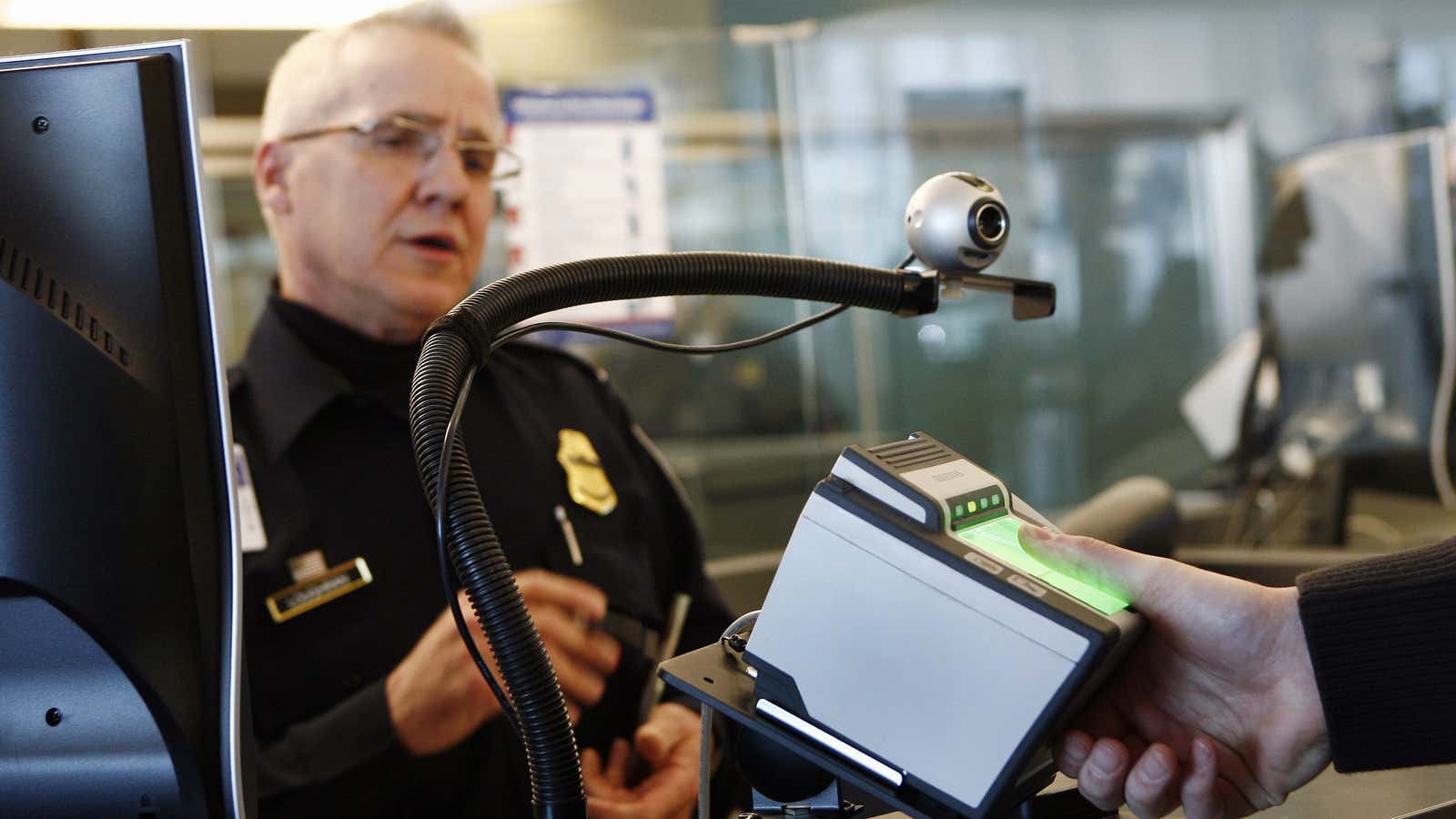JFK International airport, New York
When US customs agents demanded ID before letting passengers leave a domestic flight last week, it generated a visceral response, shedding light on Americans’ complicated relationship to the US security state.
On Feb. 23, passengers on a San Francisco flight to JFK airport in New York tweeted out images of Customs and Border Protection (CBP) agents checking every passenger’s ID as they deplaned: “We were told we couldn’t disembark without showing our ‘documents,’” wrote passenger Annie Garrett. Matt O’Rourke, who was also on the plane, added: “you guys are scaring me.”
Everyone who takes a flight in the United States knows they will have to show ID to security officials. When you go the airport these days, you expect your property to be screened and searched—and those passengers who aren’t white often anticipate far more invasive measures.
But even a small deviation from the post-9/11 routine can still make some travelers very nervous.
“I would just feel like my rights were completely violated,” said Alaina Morgan, 35, a PhD student who was flying in from Portland to New York on Feb. 24. As a US citizen, she said, you should have the right to traverse the country without being asked for your papers. “It’s really frightening what is happening,” said Morgan.
In response to questions from Quartz, a CBP spokesperson said that on Feb. 24, the agency was asked by its sister agents at Immigration and Customs Enforcement (ICE) to help in a search for one individual with a deportation order.
Passengers on the flight said they were told they would have to show their documents to get off the plane, but the CBP claimed that agents had merely requested cooperation: “To assist ICE, CBP requested consensual assistance from passengers aboard the flight to determine whether the removable individual in question was in fact aboard the flight. In the course of seeking this assistance, CBP did not compel any of these domestic passengers to show identification.”
It’s questionable whether the agency has the statutory right to forcibly ask passengers for their papers on a domestic flight.
“A search for a specific individual cannot include every person on a plane, regardless of sex, race, and age. That is a general paper check of the kind familiar to anyone who has traveled in an authoritarian country,” wrote Garrett Epps, a professor of constitutional law at the University of Baltimore, in a piece for The Atlantic.
He found no evidence of CBP having the legal right to require an ID check after a domestic flight.
Travelers at JFK said they had never heard of this happening on a domestic flight before.
Nile Rodgers, 64, a renowned musician who was flying into JFK from New Orleans, was dumbfounded that the ID check happened on a domestic flight. He said he’d be “unbelievably uncomfortable and pissed off” in a similar situation, because being able to travel freely as an American is an “incredible privilege.”
Irene, 45, declined to give her last name because she works as a budget consultant for a government agency.
She said she was concerned that she did not have an “enhanced ID,” a form of driver’s license that has some limited passport features, for her trip. “As a non-Caucasian, that was my worry,” she said of the incident. “That because I look different, I could be detained.” Irene was born in the US, as was her father, she said. “When you don’t look the same, anything can happen in this climate,” she said, referring to the Trump administration’s immigration crackdown.
She compared the situation to growing up in West Germany during the Cold War, where her father worked at the time. When she crossed into East Berlin, she was frequently ordered to show her travel documents.
Sam Connor, 54, is a naturalized citizen who was born in England. He works as a consultant for the non-profit sector. He was flying to Seattle and felt uneasy at the prospect of being asked for his documents. “I’m foreign born, it’s not difficult to think it could be me or someone in my family,” he said.
Phil Biggs, 32, who was flying in from Portland, said the checks were unnecessary. “Why would we need to go through that if we went through TSA?” Biggs said he’d likely be concerned for his own security. “Is there a reason that I should feel unsafe? Is there something wrong?”
Arthur Lukash, 82, and his wife Sharry, 70, said they wouldn’t have a problem with handing over their documents. “I would assume they were looking for somebody, for something,” Lukash said. “If they are a legitimate official, I would say ‘why not?’”He added: “Are they intruding my privacy? I don’t think so.”
Sharry emphasized that “in general we are very sympathetic to people who have been here illegally,” but that her feeling would be “I know I’m okay. I don’t have anything to hide.”
The Trump administration’s harsh immigration policies have heightened the overtly racial nature of the interactions that CBP and ICE have with many travelers. But it’s not a new phenomenon.
The US ”security state” was created largely as a means of controlling populations of color, said William Armaline, associate professor of sociology at San José State University, who has written on perceptions of authority and race.
“People are more or less cognizant of this fact that the police state constructs certain people as criminal. And they are more or less cognizant whether or not they fall into this category,” he said. “That’s why people are saying: I’m scared, because I think this affects me, I’m not scared, because I don’t think this affects me at all.”
(Of the people Quartz spoke to at JFK, Morgan and Rodgers are African-American, Irene identified as “Asian,” and Connor, Biggs, and the Lukashs are white.)
